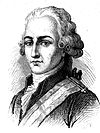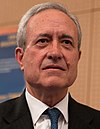Mayor of Paris
| Mayor of Paris | |
|---|---|
| Maire de Paris | |
 | |
since 5 April 2014 | |
| Residence | Hôtel de Ville |
| Appointer | Elected by the Council of Paris |
| Term length | 6 years, renewable once |
| Inaugural holder | Jean Sylvain Bailly |
| Formation | 15 July 1789 20 March 1977 |
| Salary | €8,650 (monthly) |
| Website | www.paris.fr |
The mayor of Paris (French: Maire de Paris, [mɛʁ d(ə) paʁi]) is the chief executive of Paris, the capital and largest city in France.
The officeholder is responsible for the administration and management of the city, submits proposals and recommendations to the Council of Paris, is active in the enforcement of the city's ordinances, submits the city's annual budget and appoints city officers, department commissioners or directors, as well as members of city boards and commissions. During meetings of the Council of Paris, the mayor serves as the presiding officer, as it is the case in any other commune in France. Since Paris doubles as a department as well, the mayor also has the rank of a departmental council president.
Since 5 April 2014, Anne Hidalgo of the Socialist Party has been Mayor of Paris.
History
When the French Revolution began after the storming of the Bastille on 14 July 1789, the city insurgents murdered the last Provost of Paris (Provost of the Merchants), Jacques de Flesselles. Because the Provost's office was abolished as one of the first moves with the dissolution of the Ancien Régime, the insurgents established a revolutionary government called the "Commune of Paris", initially led by Jean Sylvain Bailly, the first titled "Mayor of Paris". The mayor's office was very important during the critical phases of the Revolution, and during Robespierre's Reign of Terror (1793–1794) it was decisive in the discovery and execution of all suspected counter-revolutionaries. In July 1794, after the 9th Thermidor, the coup d'état that deposed and executed Robespierre and his cronies, the office of Mayor was abolished since it was perceived to be too powerful.
After the February Revolution of 1848, the July Monarchy ended in favor of a new Republic, that restored the mayor's office. This renewal was however short, as the June Days uprising of the same year ended the possibility of creating a strong mayorship. The Executive Commission—charged to provisionally rule the country—preferred to transfer the mayor's powers to the Seine Prefect, appointed by Ministry of the Interior.
In 1870, once again, the office of Mayor of Paris was re-established and again did not survive long. The occasion for the re-creation was the fall of the Second Empire after the defeat in the Franco-Prussian War. The provisional Government of National Defense of Louis-Jules Trochu believed that a strong leadership in Paris would prevent sedition during the Prussian siege. After the definitive conquest of Paris by Prussians, popular discontent erupted in a new insurrectionary Commune which held socialist beliefs. Also, in case the Commune was finally suppressed, the new national government preferred to divide Paris into several distinct mayorships (one for each arrondissement) to prevent the city's total loss in the event of further revolts.
Thus, for all but 14 months from 1794 to 1977, Paris was the only commune of France without a mayor, and had less autonomy than even the smallest village. For most of the time from 1800 to 1977 (except briefly in 1848 and 1870–71), it was controlled directly by the departmental prefect (the prefect of the Seine before 1968 and prefect of Paris after 1968). In 1975 Parliament passed a bill re-establishing an elected mayor for Paris, beginning in 1977. The bill was signed by President Valéry Giscard d'Estaing on 31 December 1975. In March 1977, after the first formal municipal election, former Prime Minister Jacques Chirac was chosen as Mayor of Paris, a position he held until 1995, when was elected President of France.
List of officeholders
Notes † Died in office
| No. | Mayor | Term in office Elections |
Previous office | Party | Deputy | ||
|---|---|---|---|---|---|---|---|
| 1 | 
|
Jean Sylvain Bailly 1736–1793 (Aged 57) |
15 July 1789 | 18 November 1791 | President of the National Assembly (1789) |
Patriotic | Office did not exist |
| 1789 | |||||||
| 2 | 
|
Jérôme Pétion de Villeneuve 1756–1794 (Aged 38) |
18 November 1791 | 1 December 1792 | Representative to Estates General for the Third Estate (1789) |
Girondin | |
| 1791 | |||||||
| 3 | Henri Lefèvre d'Ormesson 1751–1808 (Aged 56) |
21 November 1792 | 8 December 1792 | Judge in the 6th arrondissement (1790–1792) |
Girondin | ||
| 1792 (November) | |||||||
| 4 | 
|
Nicolas Chambon 1748–1826 (Aged 78) |
8 December 1792 | 14 February 1793 | Paris Financial Administrator (1790–1791) |
Girondin | |
| 1792 (December) | |||||||
| 5 | 
|
Jean-Nicolas Pache 1746–1823 (Aged 77) |
14 February 1793 | 10 May 1794 | Minister of War (1792–1793) |
Jacobin | |
| 1793 | |||||||
| 6 | 
|
Jean-Baptiste Fleuriot-Lescot † 1761–1794 (Aged 33) |
10 May 1794 | 27 July 1794 | Public Prosecutor of the Revolutionary Tribunal (1793–1794) |
Jacobin | |
| 1794 | |||||||
| Office abolished (1794–1848) | |||||||
| 7 | 
|
Louis Antoine Pagès 1803–1878 (Aged 75) |
24 February 1848 | 9 March 1848 | MP for Eure (1846–1848) |
Constitutionalist Republican |
Office did not exist |
| N/A | |||||||
| 8 | 
|
Armand Marrast 1801–1852 (Aged 50) |
9 March 1848 | 19 July 1848 | MP for Haute-Garonne (1848–1849) |
Constitutionalist Republican | |
| N/A | |||||||
| Office abolished (1848–1870) | |||||||
| 9 | 
|
Étienne Arago 1802–1892 (Aged 90) |
4 September 1870 | 15 November 1870 | MP for Pyrénées-Orientales (1848–1851) |
Radical Republican | Office did not exist |
| N/A | |||||||
| 10 | 
|
Jules Ferry 1832–1893 (Aged 60) |
15 November 1870 | 18 March 1871 | MP for Seine (1869–1870) |
Moderate Republican | |
| N/A | |||||||
| Office abolished (1871–1977) | |||||||
| 11 | 
|
Jacques Chirac 1932–2019 (Aged 86) |
20 March 1977 | 13 March 1983 | Prime Minister of France (1974–1976) |
Rally for the Republic | Christian de La Malène |
| 1977 | |||||||
| 13 March 1983 | 19 March 1989 | Jean Tiberi | |||||
| 1983 | |||||||
| 19 March 1989 | 16 May 1995 | ||||||
| 1989 | |||||||
| 12 | 
|
Jean Tiberi Born 1935 |
22 May 1995 | 25 March 2001 | MP for Paris (1976–2012) |
Rally for the Republic | Jacques Dominati |
| 1995 | |||||||
| 13 | 
|
Bertrand Delanoë Born 1950 |
25 March 2001 | 16 March 2008 | Senator for Paris (1995–2001) |
Socialist Party | Anne Hidalgo |
| 2001 | |||||||
| 16 March 2008 | 5 April 2014 | ||||||
| 2008 | |||||||
| 14 | 
|
Anne Hidalgo Born 1959 |
5 April 2014 | 3 July 2020 | Deputy Mayor of Paris (2001–2014) |
Socialist Party | Bruno Julliard |
| 2014 | |||||||
| 3 July 2020 | Incumbent | Emmanuel Grégoire | |||||
| 2020 | |||||||
See also
References
- A list of provosts of the merchants (deleted from this article in 2017) is found in La Grande Encyclopédie, volume 25, page 1063, published in 1899. See scan of the full text at Gallica.
- The list of mayors since 1789 comes from Paris city hall's website. See Historique des maires de Paris.

